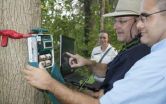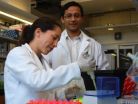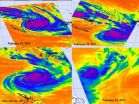(Press-News.org) WEST LAFAYETTE, Ind. - A Purdue University researcher is leading an effort to create a new scientific field that will use sound as a way to understand the ecological characteristics of a landscape and to reconnect people with the importance of natural sounds.
Soundscape ecology, as it's being called, will focus on what sounds can tell people about an area. Bryan Pijanowski, an associate professor of forestry and natural resources and lead author of a paper outlining the field in the journal BioScience, said natural sound could be used like a canary in a coal mine. Sound could be a critical first indicator of environmental changes.
Pijanowski said sound could be used to detect early changes in climate, weather patterns, the presence of pollution or other alterations to a landscape.
"The dawn and dusk choruses of birds are very characteristic of a location. If the intensity or patterns of these choruses change, there is likely something causing that change," Pijanowski said. "Ecologists have ignored how sound that emanates from an area can help determine what's happening to the ecosystem."
Part of his research will be to capture sounds that are being lost and attempting to restore their value to people. Pijanowski said natural sounds such as birds chirping, wind rustling through leaves and even the absence of noise not only have aesthetic significance, but also can give people valuable information about what's happening around them.
Pijanowski has already begun some of the soundscape ecology work in various natural and human-dominated landscapes around Tippecanoe County in Indiana. More than 35,000 recordings were used to characterize the rhythms of the natural sound and how varying degrees of human development affected those rhythms. One of the most significant findings was that as human impact in the landscape increases, the natural rhythms of sound created by the diverse wildlife population are replaced by low and constant human-produced noise.
"As we continue to become more and more urban, we get used to the urban sounds which are mostly just noise. We're so used to blocking out noise that we block out the natural sounds as well," Pijanowski said. "Animals create sounds for a reason: to convey information. Noise carries no information with it generally. The sound of a car passing by is important, but it is simply making noise as a result of friction. The noise it makes has no information. It's not an intentional signal being produced by a sentient being."
Pijanowski said society has become more visual and he wants to restore the importance of sound to our experiences. He said psychologists call the broader disconnect Nature Deficient Disorder, and Pijanowski believes that reconnecting with sounds will open doors to reconnecting with nature - something he views as important to being environmentally conscious.
"If we disconnect with the sounds of nature, will we continue to respect and sustain nature?" Pijanowski said.
While Pijanowski is eager to develop research projects in soundscape ecology, he acknowledged a few challenges associated with starting a new scientific field.
There is no established vocabulary for the field, and Pijanowski anticipates creating new terminology and has already borrowed from related fields. For example, he uses the terms "biophony" (the sounds created by organisms) and "geophony" (the sounds of non-biological entities such as wind and thunder) from the field of acoustic ecology, which focuses on using natural sounds to create musical compositions.
This new field is able to move forward because computerized sensor technologies are becoming reliable and cost-effective. Soundscape ecology is dependent on sensor technology and custom software. To bolster interest, Pijanowski is making software tools and sound file examples available to help researchers interested in becoming involved in the research.
"It is really difficult to find people who think the same way since it's such a new field," Pijanowski said. "There are really only a handful of us so far. But we believe in the science and hope to attract others who will make significant contributions."
Those others will come from a wide array of fields. Pijanowski said he'll work with researchers in spatial ecology, land-use planning, conversation biology, bioacoustics, cognitive psychology, informatics and acoustic engineering, to name a few.
INFORMATION:
Writer: Brian Wallheimer, 765-496-2050, bwallhei@purdue.edu
Source: Bryan Pijanowski, 765-496-2215, bpijanow@purdue.edu
PHOTO CAPTION:
Luis J. Villanueva-Rivera, from right, Bryan Pijanowski and Sarah Dumyahn collect data from a remote listening post that records sounds from the surrounding area. (Purdue Agricultural Communication photo/Tom Campbell)
A publication-quality photo is available at http://news.uns.purdue.edu/images/2010/pijanowski-sound.jpg
Abstract on the research in this release is available at: http://www.purdue.edu/newsroom/research/2011/110301PijanowskiSoundscap.html
New scientific field will study ecological importance of sounds
2011-03-02
ELSE PRESS RELEASES FROM THIS DATE:
Study: Happiness improves health and lengthens life
2011-03-02
CHAMPAIGN, lll. — A review of more than 160 studies of human and animal subjects has found "clear and compelling evidence" that – all else being equal – happy people tend to live longer and experience better health than their unhappy peers.
The study, in the journal Applied Psychology: Health and Well-Being, is the most comprehensive review so far of the evidence linking happiness to health outcomes. Its lead author, University of Illinois professor emeritus of psychology Ed Diener, who also is a senior scientist for the Gallup Organization, of Princeton, N.J., analyzed ...
For alcoholics, new help in abstaining -- without thinking about it
2011-03-02
Alcoholism is a tough addiction to kick. Eventually, most people return to drinking. But some Dutch and German psychological scientists have tested a short-term regime that promises to help alcoholics stay sober. Their study is published in Psychological Science, a journal of the Association of Psychological Science.
Heavy drinkers tend to behave impulsively in response to temptation. Meanwhile, their "reflective," or controlled, responses—the thoughts that would help them resist drinking—are often weak. Most therapies, including Cognitive Behavior Therapy, primarily ...
Researchers pinpoint patients who receive greatest benefit from heart failure treatment
2011-03-02
Mild heart failure patients with a particular condition that results in disorganized electrical activity throughout the heart benefit substantially from cardiac resynchronization therapy with defibrillator (CRT–D), according to a study published in the American Heart Association journal Circulation.
In patients with the condition, known as left bundle branch block or LBBB, CRT-D therapy reduced heart failure progression and the risk of ventricular tachyarrhythmias, fast and potentially life-threatening heart rhythms. Heart failure patients without LBBB did not receive ...
Scientists discover genetic switch that increases muscle blood supply
2011-03-02
Many people suffer from a devastating condition known as critical limb ischemia (CLI) that can lead to muscle wasting and even amputation. The disease is linked to the blockage of blood flow to the skeletal muscle and current treatment options include rehabilitative exercise and surgical bypass of blood vessels. New preclinical research suggests there may be a way to restore blood supply in skeletal muscle without traditional intervention.
Scientists at The University of Texas Health Science Center at Houston (UTHealth) and the Salk Institute for Biological Studies ...
OFC/NFOEC 2011: Advances in wireless, data centers, cloud computing, network capacity
2011-03-02
WASHINGTON, March 1—The world's largest international conference on
optical communications will take place March 6-10 at the Los Angeles Convention Center. The Optical Fiber Communication Conference and Exposition/National Fiber Optic Engineers Conference (OFC/NFOEC) is the premier telecom meeting where experts from industry and academia share their results, experiences, and insights on the future of electronic and wireless communication and optical technologies. More than 10,000 attendees and an exhibit with 500 companies are expected.
CONFERENCE HIGHLIGHTS
Plenary ...
For first time, scientists show an HIV vaccine impacts the genetic makeup of the virus
2011-03-02
An AIDS vaccine tested in people, but found to be ineffective, influenced the genetic makeup of the virus that slipped past. The findings suggest new ideas for developing HIV vaccines.
The results were published Feb. 27 in Nature Medicine.
This is the first evidence that vaccine-induced cellular immune responses against HIV-1 infection exert selective pressure on the virus. "Selective pressure" refers to environmental demands that favor certain genetic traits over others.
The senior author of the multi-institutional study is Dr. James I. Mullins, University of Washington ...
NASA tracks the brief life of Tropical Cyclone Atu in the southern Pacific
2011-03-02
Tropical Cyclone Atu had a brief but memorable life last week, and NASA's Atmospheric Infrared Sounder (AIRS) instrument that flies aboard NASA's Aqua satellite captured a day-by-day look at its growth and death.
AIRS provides infrared images of atmospheric phenomena, oceans and land areas around the world. Basically, infrared data takes the temperature of these things. When NASA's Aqua satellite flew over Tropical Cyclone Atu from February 21 through the 25 it saw thunderstorm cloud tops grow colder as the clouds grew higher and thunderstorms became more powerful. When ...
NASA's Glory Satellite scheduled for launch March 4
2011-03-02
WASHINGTON -- NASA's Glory spacecraft is scheduled for launch on Friday, March 4. Technical issues with ground support equipment for the Taurus XL launch vehicle led to the scrub of the original Feb. 23 launch attempt. Those issues have been resolved.
The March 4 liftoff from Vandenberg Air Force Base, Calif., is targeted for 5:09:43 a.m. EST, in the middle of a 48-second launch window. Spacecraft separation occurs 13 minutes after launch.
Data from the Glory mission will allow scientists to better understand how the sun and tiny atmospheric particles called aerosols ...
Tanning bed exposure can be deadly when complicated by medication reactions
2011-03-02
INDIANAPOLIS – Tanning bed exposure can produce more than some tanners may bargain for, especially when they self-diagnose and use the radiation to treat skin eruptions, according to research conducted by the Indiana University School of Medicine Department of Dermatology.
"There are many reasons to be cautious of tanning bed radiation but some people use tanning beds to 'self-treat' skin eruptions," said Jeffrey B. Travers, M.D., Ph.D., senior author of a study published online in the Archives of Dermatology. "If the skin eruption is eczema or even psoriasis, a tanning ...
Discovery of source of glycogen 'manufacturing' errors sheds light on fatal disease
2011-03-02
Indiana University scientists have solved a perplexing mystery regarding one of the body's main energy storage molecules, in the process shedding light on a possible route to treatment of a rare but deadly disease in teenagers.
The disease occurs when a genetic mutation causes excessive amounts of phosphate to build up in glycogen. Glycogen is a chain-like molecule the body uses to temporarily store glucose when it's not needed to provide energy for cellular activities. The excess phosphate causes unnatural glycogen structures to appear in the body, including the brain, ...







